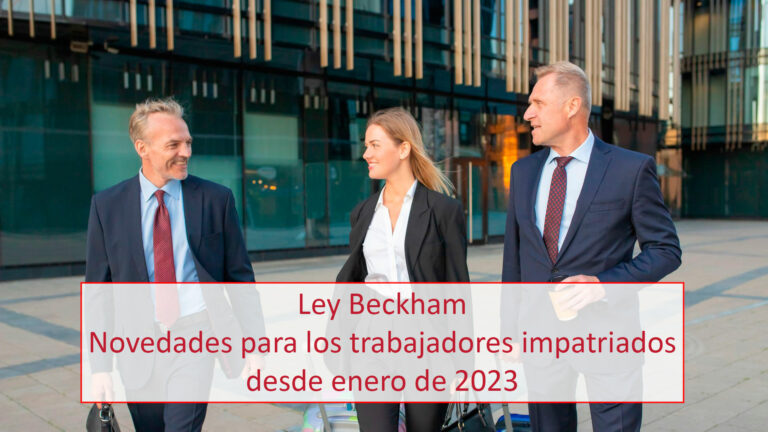
Individuals who acquire their tax residence in Spain as a result of moving to Spanish territory may opt to pay Non-Resident Income Tax, in compliance with the special rules established for this purpose in Article 93(2) of Law 35/2006 of 28 November on Personal Income Tax.
This regime allows non-resident workers posted to Spanish territory who acquire their tax residence in Spain to be taxed at a general flat rate of 24% (up to 600,000 euros of income, the excess being taxed at 47%). This regime is applicable in the year in which it is granted and in the following five years, unless the taxpayer renounces it or the tax authorities exclude it.
Some of the requirements that, to date, have been demanded in order to be able to apply this regime have been relaxed, including reducing from ten to five years the tax periods prior to moving to Spanish territory in which the taxpayer does not have to be a tax resident in Spain.
With the new modification of the regulations, from 2023, the range of persons who can benefit from this regime will open up. In the previous wording of article 93 of the Personal Income Tax, it was only applicable to employees and directors who owned less than 25% of the capital of their company.
With the new text, taxpayers who meet any of the following circumstances may apply to this regime from 2023:
Regardless of the percentage of shareholding held, except in the case of an asset-holding entity, for which a shareholding of less than 25% in the capital of the same is still required.
As a consequence of exercising in Spain an economic activity qualified as an “entrepreneurial activity”. Entrepreneurial activity is understood to be that which is innovative and/or of special economic interest for Spain, for which the taxpayer must have a favourable report issued by ENISA, the public company responsible for recognising this type of entrepreneurial activity.
As a consequence of exercising an economic activity in Spain by a self-employed professional providing services to start-ups (as stated in Article 3 of Law 28/2022 of 21 December on the promotion of the start-up ecosystem) or carrying out training, research, development and innovation activities for which he/she receives remuneration representing in aggregate more than 40% of the total business, professional and personal work income.
Also when the employment relationship is provided at a distance, at the request or not of the company, through the exclusive use of computer, telematic and telecommunication means and systems, i.e. teleworking. For this purpose, the taxable person must have an international teleworking visa.
The visa to be applied for at the Diplomatic Missions and Consular Offices will be valid for 3 years when the applicant is legally in Spain; if the visa is applied for outside Spain, it will be valid for 1 year, unless the period of work is shorter, in which case it will be granted for the same period. After the year has elapsed, you must apply for a residence permit.
The spouse of the person moving to Spanish territory, as well as their children under 25 years of age or those children whatever their age in the case of disability, may also opt to take advantage of this regime. To do so, the family members must travel to Spain in the same tax period and the sum of the annual taxable income of each of them must be less than that of the first person to apply, who can be referred to as the “main taxpayer”.
The original conditions of the city of Malaga and its coast (climate, geographical location, gastronomy,…
The rules for distributing dividends in capital companies are set out in Royal Legislative Decree…
The Supreme Court, in a recent ruling (STS 707/2023, of February 28) ruled on whether…
The presence of a notary public and the public faith that he or she imparts…
We obtain a favourable ruling in an eviction trial condemning the tenant to vacate the…
Many property purchasers when buying high value properties wonder whether it would be a good…